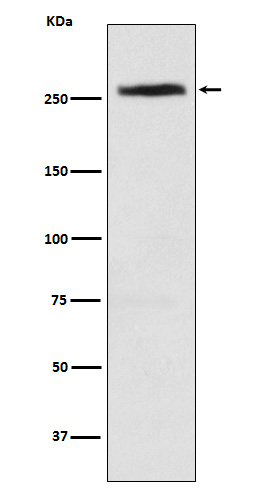CAD Antibody
Rabbit mAb
- SPECIFICATION
- CITATIONS
- PROTOCOLS
- BACKGROUND

Application
| WB, FC, ICC, IP |
|---|---|
| Primary Accession | P27708 |
| Clonality | Monoclonal |
| Other Names | Aspartate transcarbamylase; CAD protein; CAD trifunctional protein; Carbamoyl phosphate synthetase 2; CPSase ATCase DHOase; Dihydroorotase; |
| Isotype | Rabbit IgG |
| Host | Rabbit |
| Calculated MW | 242984 Da |
| Dilution | WB 1:500~1:1000 ICC/IF 1:50~1:200 IP 1:30 FC 1:80 |
|---|---|
| Purification | Affinity-chromatography |
| Immunogen | A synthesized peptide derived from human CAD |
| Description | Carbamoyl phosphate synthetase-aspartate carbamoyltransferase-dihydroorotase (CAD) is a multifunctional protein that initiates and regulates mammalian de novo pyrimidine biosynthesis. |
| Storage Condition and Buffer | Rabbit IgG in phosphate buffered saline , pH 7.4, 150mM NaCl, 0.02% sodium azide and 50% glycerol. Store at +4°C short term. Store at -20°C long term. Avoid freeze / thaw cycle. |
| Name | CAD (HGNC:1424) |
|---|---|
| Function | Multifunctional protein that encodes the first 3 enzymatic activities of the de novo pyrimidine pathway: carbamoylphosphate synthetase (CPSase; EC 6.3.5.5), aspartate transcarbamylase (ATCase; EC 2.1.3.2) and dihydroorotase (DHOase; EC 3.5.2.3). The CPSase-function is accomplished in 2 steps, by a glutamine-dependent amidotransferase activity (GATase) that binds and cleaves glutamine to produce ammonia, followed by an ammonium-dependent carbamoyl phosphate synthetase, which reacts with the ammonia, hydrogencarbonate and ATP to form carbamoyl phosphate. The endogenously produced carbamoyl phosphate is sequestered and channeled to the ATCase active site. ATCase then catalyzes the formation of carbamoyl-L-aspartate from L-aspartate and carbamoyl phosphate. In the last step, DHOase catalyzes the cyclization of carbamoyl aspartate to dihydroorotate. |
| Cellular Location | Cytoplasm. Nucleus. Note=Cytosolic and unphosphorylated in resting cells, translocates to the nucleus in response to EGF stimulation, nuclear import promotes optimal cell growth |

Thousands of laboratories across the world have published research that depended on the performance of antibodies from Abcepta to advance their research. Check out links to articles that cite our products in major peer-reviewed journals, organized by research category.
info@abcepta.com, and receive a free "I Love Antibodies" mug.
Provided below are standard protocols that you may find useful for product applications.
If you have used an Abcepta product and would like to share how it has performed, please click on the "Submit Review" button and provide the requested information. Our staff will examine and post your review and contact you if needed.
If you have any additional inquiries please email technical services at tech@abcepta.com.













 Foundational characteristics of cancer include proliferation, angiogenesis, migration, evasion of apoptosis, and cellular immortality. Find key markers for these cellular processes and antibodies to detect them.
Foundational characteristics of cancer include proliferation, angiogenesis, migration, evasion of apoptosis, and cellular immortality. Find key markers for these cellular processes and antibodies to detect them. The SUMOplot™ Analysis Program predicts and scores sumoylation sites in your protein. SUMOylation is a post-translational modification involved in various cellular processes, such as nuclear-cytosolic transport, transcriptional regulation, apoptosis, protein stability, response to stress, and progression through the cell cycle.
The SUMOplot™ Analysis Program predicts and scores sumoylation sites in your protein. SUMOylation is a post-translational modification involved in various cellular processes, such as nuclear-cytosolic transport, transcriptional regulation, apoptosis, protein stability, response to stress, and progression through the cell cycle. The Autophagy Receptor Motif Plotter predicts and scores autophagy receptor binding sites in your protein. Identifying proteins connected to this pathway is critical to understanding the role of autophagy in physiological as well as pathological processes such as development, differentiation, neurodegenerative diseases, stress, infection, and cancer.
The Autophagy Receptor Motif Plotter predicts and scores autophagy receptor binding sites in your protein. Identifying proteins connected to this pathway is critical to understanding the role of autophagy in physiological as well as pathological processes such as development, differentiation, neurodegenerative diseases, stress, infection, and cancer.


